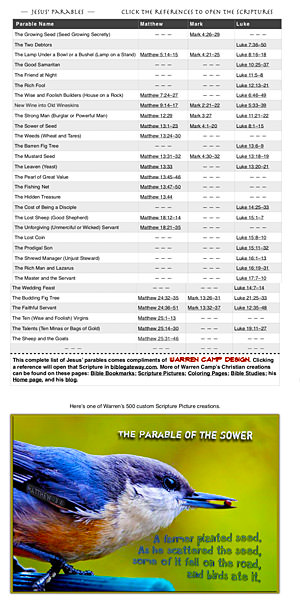
In this parable, Jesus presented two men who went to pray at the temple. The Pharisee (who many thought was good) was excessively proud; he told God all of the good things he’d done and how he was better than other people.
A tax collector (who many thought was bad) was humble; he asked God only to have mercy on him because he was a sinner.

† Find Warren’s short summary at the bottom of page.
Click the list or the “bird” to enlarge and use Warren’s list of forty-four of Jesus’ parables (a PDF file with links to Scriptures).

Watch this popular JESUS film clip about the Parable of the Pharisee and the Tax Collector.
Start Reading Warren’s Commentary . . .
Find his summary at the bottom.
par•a•ble [noun] a simple story used to illustrate the meaning of or a moral or spiritual lesson, as told by Jesus in the gospels
synonyms: allegory, moral story/tale, fable
Jesus’ Parable of the Pharisee and the Tax Collector
Luke 18:9–14
Scripture warns us that “God opposes the proud but gives grace to the humble” (James 4:6; Proverb 3:34; and 1 Peter 5:5). In this popular parable, Jesus paints a vivid story of two men at prayer. What’s the point or lesson he wants us to learn? Luke gives us a hint: Jesus warns us about the danger of despising others.
Jesus’ story caused offense for those who regarded “tax collectors” as unworthy of God’s grace and favor. How could Jesus put down a “religious leader” and raise up a “public sinner”?
This parable presents an opportunity and a warning: Pride leads to illusion and self-deception, while humility helps us see ourselves as we really are, readying us for God’s grace and mercy. God dwells with the humble of heart who are those who recognize their own sinfulness and acknowledge God’s mercy and saving grace.
A 3-minute presentation of Jesus telling many people this parable. From the JESUS film; Jesus Film Project.
The Parable of the Pharisee and Tax Collector
Self-Righteousness
In Jesus’ day, the Pharisees were the strict Jews. They believed, they were disciplined, they took the Law seriously — so seriously, in fact, that they created a “hedge” around the law, the Oral Law, with the idea that if they kept the rules of the Oral Law (the tradition of the elders), they wouldn’t be breaking the Mosaic Law. Each was passionate about pleasing God and avoiding godless ways.
Looking Down on Others (vv. 9–10)
Luke precedes the parable by naming its intended target. The first characteristic of the target is “confident of their own righteousness.”
To some who were confident of their own righteousness and looked down on everybody else, Jesus told this parable: “Two men went up to the temple to pray, one a Pharisee and the other a tax collector” (vv. 9–10).
The temple was the appointed place for Jewish prayer. To it, the Jew went if near at hand; towards it, he prayed from afar. When Jesus introduces us to the characters in this parable — a Pharisee and a tax collector (or publican) — the two represent the extremes of Jewish social and religious life. Tax collectors weren’t just hated because they were considered turncoats and traitors; they were also considered cheaters. They would sometimes assess more taxes than was legal. Many tax collectors didn’t play by the rules, while, on the other hand, the Pharisees played the rules to their advantage.
There’s nothing wrong with rules. Each family has to have family rules, just as each church needs to have church rules; it’s a requirement of any human organization. We need to keep our rules in perspective and realize that they’re not necessarily God’s rules, merely derivatives of God’s rules.
A problem arises, however, when we’re “confident in our righteousness” or we “trust in our righteousness to save us and justify us before God.” When we move from righteous living — which is right — to trusting in that righteous living so that it might give us a good standing before God, we then commit a fatal error. In this case, “righteousness” becomes “self-righteousness.”
When we begin to take pride in our righteous behavior, it’s very easy to look down on those who don’t behave as we do. We then tend to see them as morally inferior to us. The phrase “looked down on” is Greek exoutheneo, “to show by one‘s attitude or manner of treatment that an entity has no merit or worth; ‘disdain.’”
Let’s consider whom we — faithful, righteous, Christians — tend to look down upon. Tax collectors aren’t at the top of our list, are they? I didn’t think they were. Upon whom do you look down? Jesus’ parable was intended for our ears.
Priding Oneself (vv. 11–12)
“The Pharisee stood by himself and prayed: ‘God, I thank you that I am not like other people — robbers, evildoers, adulterers — or even like this tax collector. 12I fast twice a week and give a tenth of all I get.’” (vv. 11–12).
Now Jesus, the storyteller, sets the figures into action. Jews often stood as they prayed, looking up to heaven, often with hands raised. Look at this telling statement: The Pharisee “prayed about himself.” He prayed having himself, rather than God, uppermost in his thoughts. And the Pharisee’s entire prayer was about himself! His prayer was more a boast to himself than an expression of worship toward God. True, he thanked God — not for blessings — but that he wasn’t a sinner like others. He first listed those known to be evil.
He then reminded God of how pious he was in his fasting and tithing practices. When he said, “I fast twice a week,” realize that the Law appointed only one fast in the year, on the Day of Atonement, but the Pharisees fasted on Monday and Thursday of every week. And when he said, “I give a tenth of all I get,” the Law required that tithes be given from the corn, wine, oil, and cattle. However, the Pharisees overdid it by taking account of the humblest of garden herbs, giving a tenth of their mint, anise, and cumin. Regarding each of these laws, the Pharisee was reminding God that he accomplished much more than what the Law required. Thus, he confessed his virtues rather than his sins. (If you haven’t yet seen the video, linked above, please watch it now to appreciate the pious posture of the Pharisee.)
No Excuses (v. 13)
“But the tax collector stood at a distance. He would not even look up to heaven, but beat his breast and said, ‘God, have mercy on me, a sinner’” (v. 13).
The tax collector’s prayer is as remarkable as it’s short. First, he addressed God, just as the Pharisee had done. Next, instead of telling God all the good things about himself, he described himself as a sinner. He then asked God for mercy, saying, “God, have mercy on me, a sinner.” He made a full confession of his sin without excuse or justification. Moreover, he petitioned for no temporal blessings, simply asking the Lord for mercy.
For the tax collector to have asked for forgiveness and restoration of his relationship with God was a bold, faith-filled act, especially for a man so despised by his society. He’s obviously humble and repentant of his sins, but his faith had made him bold enough to ask for something that he had no right to expect — forgiveness and restoration before God.
Justification Before God; Exalting or Humbling One’s Self (v. 14)
“I tell you that this man, rather than the other, went home justified before God. For all those who exalt themselves will be humbled, and those who humble themselves will be exalted” (v. 14).
Finally, in v. 14, Jesus brings home the application of the parable, as well as its point and meaning. He highlights a paradox of spiritual life — exalting oneself leads to humbling, while humbling leads to exaltation.
We’re taught here, as in the Parable of the Prodigal Son, that the penitent unrighteous are more acceptable to God than the righteous who make no confession of their sins. Faith and humility are marks of those men and women who follow Jesus. May they be earmarks of your character as well!
Enjoy this 2-minute animated video before answering the four application questions.
A delightful 2-minute animation by RodTheNey
Hearty Application Questions to Answer
This parable is about two very different men. The Pharisee was from a religious sect whose prime concern was keeping the Law of Moses. The tax collector was in a profession where many were considered traitors and thieves because they collected taxes for the Romans from their fellow Jews, usually making great personal profit.
Our application questions from this parable:
1. What do you think caused the Pharisee to act the way he did? Was he self-righteous or overly devoted to God?
2. Why do you think the tax collector acted the way he did? Had he a poor self-image? Did he know he’d done wrong?
3. What lesson about our prayer attitude is Jesus teaching us here? God hates self-righteousness? God loves humble repentance? God knows what’s in our hearts? God wants us to be sincere?
4. Percentage-wise, how much of the Pharisee and the tax collector do you see in yourself? Be honest!
“For all those who exalt themselves will be humbled, and those who humble themselves will be exalted” (Luke 18:14b).

Take our “Parables Quiz.”
See Warren’s other “Parables of Jesus” commentaries.
— Warren’s Concise Summary —
Jesus tells the Parable of the Pharisee and the Tax Collector to expose the difference between prideful self-righteousness and humble repentance.
A Pharisee stands in the temple and proudly thanks God that he isn’t like other sinners, boasting of his fasting and tithing. Meanwhile, a despised tax collector stands at a distance, unable even to lift his eyes to heaven, striking his chest and pleading, “God, be merciful to me, a sinner.”
Jesus declares that the tax collector, not the Pharisee, went home justified before God. The parable teaches that true righteousness comes not from self-exaltation or outward religiosity but from humility and trust in God’s mercy — for “all who exalt themselves will be humbled, and those who humble themselves will be exalted” (v. 14b).

